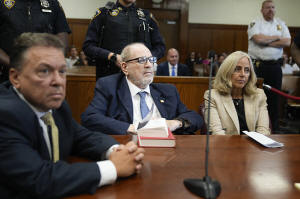Harvey Weinstein due in court as judge weighs scope of his #MeToo
retrial and when it will start
 Send a link to a friend
Send a link to a friend
 [January 29, 2025]
By MICHAEL R. SISAK [January 29, 2025]
By MICHAEL R. SISAK
NEW YORK (AP) — Harvey Weinstein is due back in court Wednesday as a
judge is set to decide when the disgraced movie mogul's #MeToo retrial
will start and whether it will include an allegation involving a woman
who wasn't in the original case.
Weinstein, 72, wants the extra charge thrown out, arguing through
lawyers that Manhattan prosecutors only brought it to bolster their case
with a third accuser after New York’s highest court overturned his 2020
conviction on rape and sexual assault charges involving two women.
Judge Curtis Farber is expected to rule on that and other matters,
including the trial date — a task that's been complicated by an
increasingly crowded court calendar.
Weinstein's lawyer, Arthur Aidala, is representing conservative
strategist Steve Bannon in a border wall fraud trial that's set to start
March 4 before a different Manhattan judge. Meanwhile, Farber has a
murder trial in March.
Before Bannon's trial date was set last week, Aidala had suggested that
Weinstein’s trial go first in “the interest of humanity,” citing the
ex-studio boss' declining health.
Weinstein is being treated for numerous medical conditions, including
chronic myeloid leukemia and diabetes.

“They know that Mr. Weinstein is dying of cancer and is an innocent man
right now in the state of New York,” Aidala argued in court last week.
He pleaded to prosecutors: “Can I try this dying man’s case first?”
Weinstein is being retried on charges that he forcibly performed oral
sex on a movie and TV production assistant in 2006 and raped an aspiring
actor in 2013. The additional charge, filed last September, alleges he
forced oral sex on a different woman at a Manhattan hotel in 2006.
The Manhattan district attorney's office said in court papers that the
woman, who has not been identified publicly, came forward to prosecutors
just days before the start of Weinstein's first trial but was not part
of that case.
Prosecutors said they did not pursue the women's allegations after
Weinstein was convicted and sentenced to 23 years in prison, but they
revisited them and secured a new indictment after the state's Court of
Appeals threw out his conviction last April.
Farber ruled in October to combine the new indictment and existing
charges into one trial.
[to top of second column]
|

Harvey Weinstein, center, appears in criminal court in New York,
Sept. 18, 2024. (AP Photo/Seth Wenig, Pool, File)
 Weinstein's lawyers contend that
prosecutors prejudiced him by waiting nearly five years to bring the
additional charge, suggesting they had elected not to include the
allegation in his first trial so they could use it later if his
conviction were reversed.
Prosecutors called that thinking “absurd,” countering that
Weinstein's lawyers would have also been outraged if he had been
charged based on the third woman's allegation either during his
first trial or immediately after his conviction.
Weinstein “would likely have characterized that timing as a
vindictive and gratuitous pile-on,” prosecutors wrote in a court
filing last month.
Manhattan District Attorney Alvin Bragg's office said the previously
uncharged allegation “required a sensitive investigation” and
serious contemplation before seeking an indictment, in part because
there are no eyewitnesses to the alleged assault and no scientific
or other physical evidence.
Weinstein co-founded the film and television production companies
Miramax and The Weinstein Company and was once one of the most
powerful people in Hollywood, having produced films such as “Pulp
Fiction” and “The Crying Game.”
In 2017, he became the most prominent villain of the #MeToo
movement, which erupted when women began going public with accounts
of his behavior.
He has long maintained that any sexual activity was consensual.
In vacating Weinstein’s conviction, the Court of Appeals ruled that
the trial judge, James M. Burke, unfairly allowed testimony against
him based on allegations from other women that were not part of the
case. Burke is no longer on the bench.
Weinstein was convicted in Los Angeles in 2022 of another rape. His
16-year prison sentence in that case still stands, but his lawyers
appealed in June, arguing he did not get a fair trial.
Weinstein has remained in custody in New York’s Rikers Island jail
complex, with occasional trips to a hospital for medical treatment,
while awaiting the retrial.
The Associated Press does not generally identify people alleging
sexual assault unless they consent to be named.
All contents © copyright 2025 Associated Press. All rights reserved |